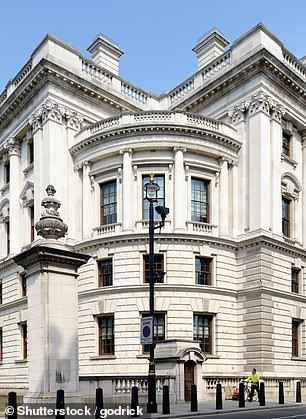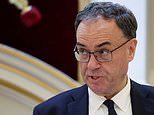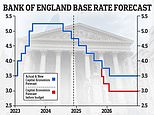I inherited a tax-free pension from my husband who died before 75 - what happens after Budget changes?

Treasury plans: Chancellor announced in the Budget that pensions will become liable for inheritance tax from April 2027
My husband died before the age of 75 and I inherited his Sipp which has been transferred to my name.
I understand that because he died before 75, I can draw on the pension tax fee. Will this still be the case from April 2027?
I have never drawn on the pension which is quite sizeable. What would you recommend I do with the funds now?
I had intended to leave the fund intact, so I could pass it on to my son, but it seems from 2027, when I do die he is going to have an enormous tax bill, with the pension being taxed twice, once at 40 per cent and then again at his marginal tax rate.
Inheritance tax will be due on the rest of my estate as well.
Tanya Jefferies, of This is Money, replies: We have received many messages from readers about plans announced in the Budget to make pensions liable for inheritance tax from April 2027.
This has upset many families' plans to bequeath unspent pots to younger generations. And wealthy people could face a 'double tax hit' on inherited pensions of up to 70.5 per cent under the new rules.
Our retirement expert Steve Webb answered a question about whether married couples can still inherit pension pots tax-free from each other after the Budget changes.
Ray Black, chartered financial planner and boss of Money Minder, responded to another reader on whether it was now a good idea to start moving £20k a year from a pension into an Isa.
He and other advisers have given a useful rundown of the questions clients are bombarding them with following the Budget, including about the 'double tax' issue you have raised here.
Below, an experienced financial adviser goes into the specifics of your own situation, where you have already inherited a tax-free pension and intended to leave it to your son. She will explain the options open to you now.
Michelle Holgate, senior financial planner at RBC Brewin Dolphin, replies: While the Budget announced pensions will lose their inheritance tax exempt status from 6 April 2027, no clarity has been given just yet over the finer details of such legislation and implementation.
A consultation is to take place over the next couple of months, which will then allow investors to make more informed decisions.

Michelle Holgate: It's likely once the changes take effect that beneficiary drawdown plans inherited before April 2027 will be subject to inheritance tax after the present holder's death
For the time being, there has been no immediate change to how pension savings are treated.
So, the beneficiary drawdown funds are exempt from inheritance tax and because your husband passed away before the age of 75, you are able to draw any amount from this plan without incurring income tax.
There has been no indication on how the inherited pension pot 'beneficiary drawdown' plans inherited before April 2027 would be treated for the purposes of inheritance tax after this date.
It is likely, however, that they will be subject to inheritance tax on your death, just like any pension savings accumulated during lifetime by yourself.
Our understanding is that the income tax rules would remain unchanged for the beneficiaries after the pensions are no longer exempt from inheritance tax and so you may be able to continue the withdrawal free of income tax.
Similarly, if you pass away before the age of 75, your son may also be able to draw this tax free, although inheritance tax would still be charged.
Should the rules regarding the income tax on withdrawals change to become taxable in full, at your highest marginal rate, then it is likely that the best course of action would be to draw all the funds available within the beneficiary drawdown and to restructure your assets before such changes take place.
What options could you consider
If the rules change, you may wish to consider using a range of planning solutions.
1. Dependent on your income needs, you may wish to review your income strategy and incorporate drawing funds from different sources.
Different income strategies may allow you to optimise the use of tax allowances, and spending the money that will not be exempt from inheritance tax may assist in reducing the potential future tax bill on your death.
2. You may wish to consider passing on money and therefore a financial legacy to your son during your lifetime instead of on your death.
This could be done by making outright gifts. There is a range of gifting allowances available that allow an immediate reduction in your estate for inheritance purposes although some gifts may continue to form part of your estate for seven years.
3. Gifting assets into trusts allows you to pass the assets to your family and friends during your lifetime as well as on death.
Whilst this would not remove the amount drawn from the beneficiary drawdown immediately from your estate, it would start the seven-year clock to reduce the inheritance tax payable in the future.
There are also trust options that may offer an immediate discount on some of the funds for inheritance tax purposes.
4. Re-investing the money into a range of different tax wrappers with a different tax treatment upon withdrawal may allow you to use allowances available for you and to potentially reduce the overall tax upon encashment made over time, to meet your own needs or those of your family.
This, however, does not change the inheritance position today. For example, you may be able to use Isa allowances with funds from the beneficiary drawdown before the new legislation comes into force.
Where beneficiary drawdown funds may become taxable after April 2027, Isa withdrawals are free of tax.
You could look at re-investing the funds into tax advantaged schemes, such as business relief, which are exempt from inheritance tax (up to £1million from April 2026) after a holding period of two years.
This may offer other tax benefits, but they are high risk strategies.
5. Financial advice to understand the risks, pros and cons of all options is paramount and is therefore highly recommended.
As always, there is no 'one size fits all' when it comes to financial planning and the solutions best suited for you will depend on your wider personal and financial circumstances.










































































